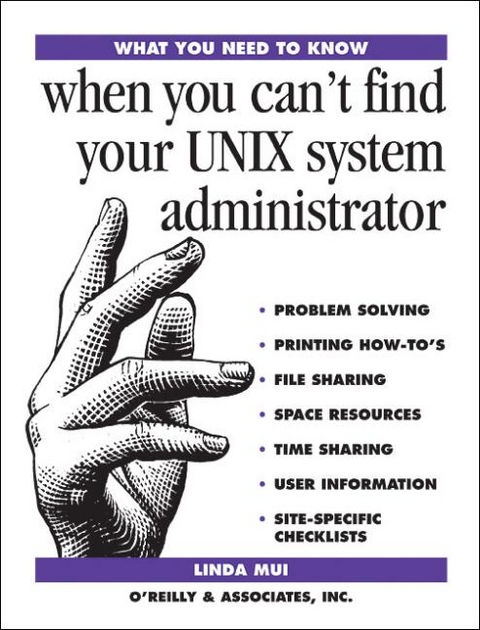
When You Can't Find Your UNIX System Administrator
O'Reilly Media (Verlag)
978-1-56592-104-7 (ISBN)
- Titel ist leider vergriffen;
keine Neuauflage - Artikel merken
This text offers UNIX users tools for solving problems. It contains: practical solutions for problems likely to be encountered in logging in, running programs, sharing files, managing space resources, and printing; background on what's going on "behind the scenes" so that you can make sense of the suggestions, rather than simply memorizing keystrokes; an explanation of how to present problems to your systems admin so that you're more likely to get quick, accurate support; a list of the site-specific information to which you should have access, and a place to write it down; and a quick-ref card summarizing what to try first, second, third for commonly encountered problems.
Linda Mui started working for O'Reilly & Associates in 1986. She was first hired as a production assistant, later became an apprentice system administrator, and now is a writer. Her first writing job was for termcap and terminfo, which she coauthored with John Strang and Tim O'Reilly. She later coauthored The X Window System Administrator's Guide with Eric Pearce. Linda was raised in the Bronx, New York, and now lives in Cambridge, Massachusetts.
What you need to know about this book Chapter 1: What you need to know about solving problems There's no magic in solving user problems: It's good detective work. We describe how best to present your problems to an administrator (for the fastest response and solutions). We then look at general troubleshooting skills: recreating the problem, reading error messages, trying obvious answers, and identifying possible factors that could have caused the problem. Chapter 2: What you need to know about logging in Logging in is a series of steps. When you can't log in, there are still things that you can check and fix. We explain checking the power supply, cables and brightness control; rebooting to reset a number of parameters; changing an .xsession file for X terminal users; when to ask for help. We also discuss password files; selecting a good password; and how to change passwords. Chapter 3: What you need to know about running programs You can run any command on the system by using its full pathname. Problems with commands are usually problems with the pointers to this full pathname. We describe where commands reside; command search paths; adding directories to your search path; different versions of the same command; using aliases for commands; file permissions; and how to fix problems with the TERM environment variable. Chapter 4: What you need to know about sharing files On a multiuser system, you can potentially share any file with any other user. File permissions are security measures that determine who can share what files. We discuss read/write/execute permissions; file ownership; how file owners can change permissions for a group or for the world; and what to do if you don't have permission to access a file. Chapter 5: What you need to know about printing Printing is a multi-step process; you have control over many steps in that process. We discuss how files are translated into a printer language (such as PostScript); how to test if a file is in PostScript format; how to control what printer a file goes to; how to check the print queue and move or cancel jobs; and simple printer troubleshooting. Chapter 6: What you need to know about space and time On a multiuser system, you share disk space and processing time with other users. Sooner or later, you'll need to know what to do to optimize your use of these resources. We cover how and where files are stored; checking disk space and the size of your directories; what kind of files to delete or compress if you need to create space. We also show how to deal with a slow system; how to check your processes; what processes are more resource-intensive than others, and how to kill unwanted processes. Chapter 7: What you need to know about everyone else Since you are on a multiuser system, you may need to find out what someone else is doing. We talk about using commands to see if someone on your system is logged on or has read mail; using the finger command to see who is on another system; creating a .plan or .project file to tell others about yourself; and finding out who is on a mail alias. What you need to know if you need to know more Index
| Erscheint lt. Verlag | 9.5.1995 |
|---|---|
| Zusatzinfo | illustrations, index |
| Verlagsort | Sebastopol |
| Sprache | englisch |
| Maße | 178 x 229 mm |
| Gewicht | 320 g |
| Einbandart | kartoniert |
| Themenwelt | Informatik ► Betriebssysteme / Server ► Unix / Linux |
| ISBN-10 | 1-56592-104-6 / 1565921046 |
| ISBN-13 | 978-1-56592-104-7 / 9781565921047 |
| Zustand | Neuware |
| Haben Sie eine Frage zum Produkt? |
aus dem Bereich


